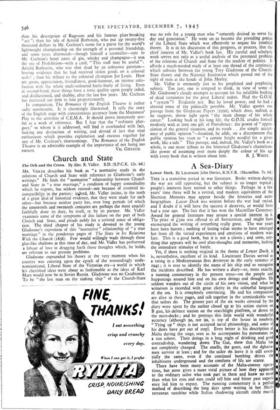Church and State
The Orb and the Cross. By Alec. R. Vidler. B.D. 12s. 64.) MR. VIDLER describes his book as "a normative - study in the relations of Church and State with reference to Gladstone's early writings." He finds the " normative " relationship between Church and State in "a true marriage," a condition of happy connubiality which he regrets, has seldom existed—not because of essential in- compatibility in the parties : indeed, Mr. Vidler insists, in the teeth of a great deal of historical evidence, that they were made for each other—but because neither party has, over long periods (of which the nineteenth and twentieth centuries are perhaps the most crucial) faithfully done its duty, by itself, or by its partner. Mr. Vidler examines some of the symptoms of this failure on the part of both Church and State, and pleads nobly for a revived sense of obliga- tion. The third chapter of his study is devoted to the young Gladstone's exposition of this "normative" relationship of "a true marriage" in the ponderous pages of The State in Its Relations With the Church (1838). Few would willingly wade through these glue-like shallows at this time of day, and Mr. Vidler has performed a labour of love in dragging forth those thoughts which, he holds, are relevant to our present problems. Gladstone expounded his theory at the very moment when his country was entering upon the epoch of the resoundingly unde- nominational, Liberal State of the Victorian era—a world in which his cherished ideas were about as fashionable as the ideas of Karl Marx would now be in Soviet Russia. Gladstone was no Casabianca. To be "the last man on the sinking ship" of the Church-State was no role for a young man who "earnestly desired to serve his day and generation." He went on to become the presiding genius of the Liberal State which was effectively to negate his youthful theory. It is in his discussion of this progress, or process, that the chief interest of Mr. Vidler's book lies. His careful and scholarly work serves not only as a useful analysis of the perennial problem of the relations of Church and State for the student of politics. It affords a much-needed study of at least one thread of the continuity which subsists between the young Tory Gladstone of the Church- State theory and the National Institution which passed out of the sight of men at the hands of John Morley.
Mr. Vidler is eminently just to his perplexed and perplexing subject. Too just, one is tempted to think, in view of some of Mr. Gladstone's cloudy attempts to account for his infallible backing of dead certainties for the great Liberal stakes. Had the G.O.M. a " system "? Evidently not. But he loved power, and he had a shrewd sense of the politically possible. Mr. Vidler quotes one passage from the Gladstone Papers (1930), which does, indeed, as he suggests, throw light upon "the main change of his whole career." Looking back at his long life, the G.O.M. credits himself modestly with at least one gift of Providence: the power of "appre- ciation of the general situation, and its result . . .the simple accept- ance of public opinion "—founded, he adds, on a discernment that public opinion has risen to "a certain height needful for a given work, like a tide." This passage, and, indeed, Mr. Vidler's book as a whole, is one more tribute to the historical Gladstone's chameleon- like power of assuming ever more deeply the colour of his age
with every book that is written about him. R. J. WHITE.






























 Previous page
Previous page